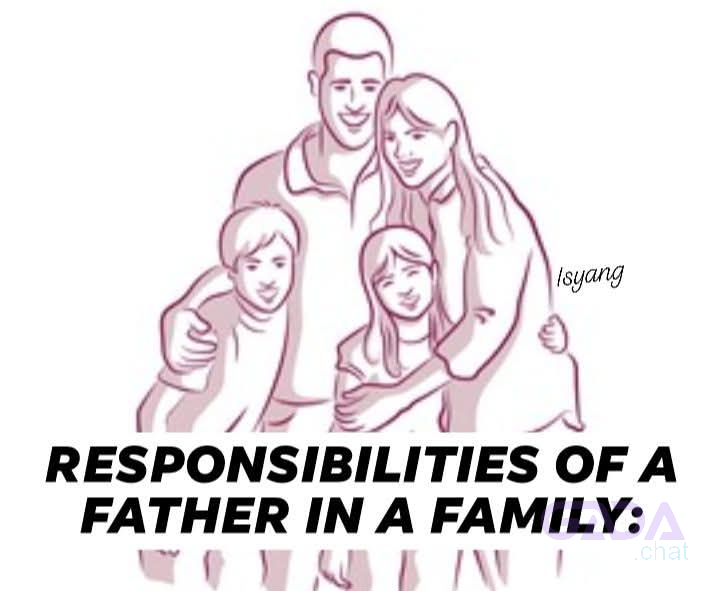RESPONSIBILITIES OF A FATHER IN A FAMILY:
PRIMARY RESPONSIBILITIES:
1. Providing financial support
2. Emotional guidance and support
3. Disciplining and setting boundaries
4. Role-modeling values and behavior
5. Protecting and ensuring family safety
EMOTIONAL SUPPORT:
1. Listening and validating feelings
2. Offering comfort and reassurance
3. Encouraging open communication
4. Supporting partner's emotional needs
5. Modeling healthy emotional expression
DISCIPLINE AND GUIDANCE:
1. Setting clear expectations and rules
2. Teaching life skills and values
3. Encouraging responsibility and independence
4. Modeling respectful communication
5. Providing constructive feedback
FINANCIAL PROVISION:
1. Managing household finances
2. Providing for family's basic needs
3. Planning for future financial security
4. Saving for children's education
5. Ensuring family's economic stability
ROLE-MODELING:
1. Demonstrating integrity and honesty
2. Modeling respectful relationships
3. Teaching respect for authority
4. Encouraging physical and mental well-being
5. Embodying values and principles
PARENTING PARTNERSHIP:
1. Co-parenting with mother
2. Sharing childcare responsibilities
3. Collaborating on discipline and guidance
4. Supporting partner's parenting style
5. Maintaining united front in parenting
COMMUNITY INVOLVEMENT:
1. Participating in children's activities
2. Volunteering in community or school
3. Building relationships with neighbors
4. Role-modeling social responsibility
5. Fostering community connections
PERSONAL GROWTH:
1. Pursuing personal interests and hobbies
2. Continuing education and self-improvement
3. Maintaining physical and mental health
4. Setting boundaries and prioritizing self-care
5. Seeking support and resources when needed
INFLUENCING CHILDREN'S DEVELOPMENT:
1. Shaping moral and ethical values
2. Encouraging educational and career goals
3. Modeling healthy relationships
4. Teaching life skills and independence
5. Fostering emotional intelligence.
Edith Paul
PRIMARY RESPONSIBILITIES:
1. Providing financial support
2. Emotional guidance and support
3. Disciplining and setting boundaries
4. Role-modeling values and behavior
5. Protecting and ensuring family safety
EMOTIONAL SUPPORT:
1. Listening and validating feelings
2. Offering comfort and reassurance
3. Encouraging open communication
4. Supporting partner's emotional needs
5. Modeling healthy emotional expression
DISCIPLINE AND GUIDANCE:
1. Setting clear expectations and rules
2. Teaching life skills and values
3. Encouraging responsibility and independence
4. Modeling respectful communication
5. Providing constructive feedback
FINANCIAL PROVISION:
1. Managing household finances
2. Providing for family's basic needs
3. Planning for future financial security
4. Saving for children's education
5. Ensuring family's economic stability
ROLE-MODELING:
1. Demonstrating integrity and honesty
2. Modeling respectful relationships
3. Teaching respect for authority
4. Encouraging physical and mental well-being
5. Embodying values and principles
PARENTING PARTNERSHIP:
1. Co-parenting with mother
2. Sharing childcare responsibilities
3. Collaborating on discipline and guidance
4. Supporting partner's parenting style
5. Maintaining united front in parenting
COMMUNITY INVOLVEMENT:
1. Participating in children's activities
2. Volunteering in community or school
3. Building relationships with neighbors
4. Role-modeling social responsibility
5. Fostering community connections
PERSONAL GROWTH:
1. Pursuing personal interests and hobbies
2. Continuing education and self-improvement
3. Maintaining physical and mental health
4. Setting boundaries and prioritizing self-care
5. Seeking support and resources when needed
INFLUENCING CHILDREN'S DEVELOPMENT:
1. Shaping moral and ethical values
2. Encouraging educational and career goals
3. Modeling healthy relationships
4. Teaching life skills and independence
5. Fostering emotional intelligence.
Edith Paul
RESPONSIBILITIES OF A FATHER IN A FAMILY:
PRIMARY RESPONSIBILITIES:
1. Providing financial support
2. Emotional guidance and support
3. Disciplining and setting boundaries
4. Role-modeling values and behavior
5. Protecting and ensuring family safety
EMOTIONAL SUPPORT:
1. Listening and validating feelings
2. Offering comfort and reassurance
3. Encouraging open communication
4. Supporting partner's emotional needs
5. Modeling healthy emotional expression
DISCIPLINE AND GUIDANCE:
1. Setting clear expectations and rules
2. Teaching life skills and values
3. Encouraging responsibility and independence
4. Modeling respectful communication
5. Providing constructive feedback
FINANCIAL PROVISION:
1. Managing household finances
2. Providing for family's basic needs
3. Planning for future financial security
4. Saving for children's education
5. Ensuring family's economic stability
ROLE-MODELING:
1. Demonstrating integrity and honesty
2. Modeling respectful relationships
3. Teaching respect for authority
4. Encouraging physical and mental well-being
5. Embodying values and principles
PARENTING PARTNERSHIP:
1. Co-parenting with mother
2. Sharing childcare responsibilities
3. Collaborating on discipline and guidance
4. Supporting partner's parenting style
5. Maintaining united front in parenting
COMMUNITY INVOLVEMENT:
1. Participating in children's activities
2. Volunteering in community or school
3. Building relationships with neighbors
4. Role-modeling social responsibility
5. Fostering community connections
PERSONAL GROWTH:
1. Pursuing personal interests and hobbies
2. Continuing education and self-improvement
3. Maintaining physical and mental health
4. Setting boundaries and prioritizing self-care
5. Seeking support and resources when needed
INFLUENCING CHILDREN'S DEVELOPMENT:
1. Shaping moral and ethical values
2. Encouraging educational and career goals
3. Modeling healthy relationships
4. Teaching life skills and independence
5. Fostering emotional intelligence.
Edith Paul ✍️✍️








